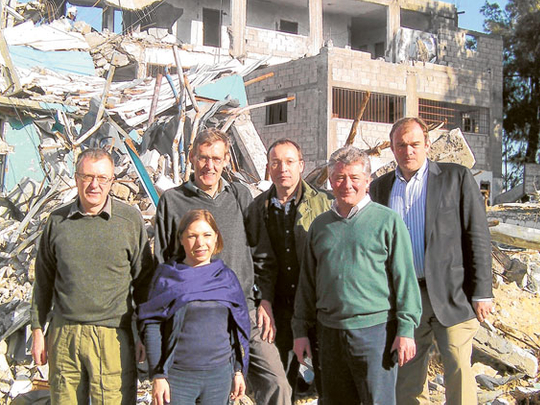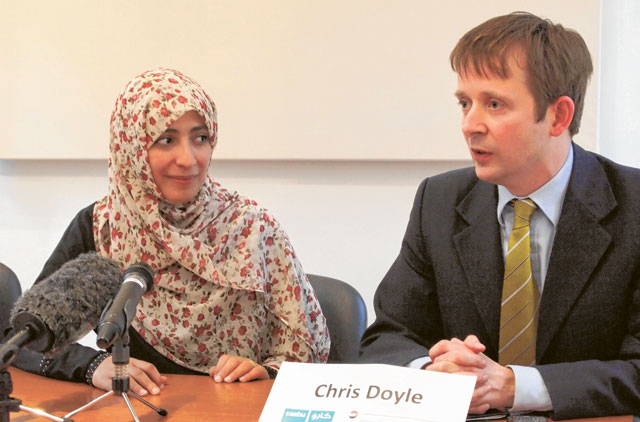
Dubai: Britain's premier pro-Arab lobby is in danger of closing down due to a lack of money, and has launched an emergency appeal for both short- and medium-term funding.
The Council for the Advancement of Arab British Understanding (Caabu) needs a minimum of £260,000 (Dh1.51 million) a year to continue, Chris Doyle, director of Caabu, told Gulf News in a telephone interview.
"At a time when so many Arabs are bravely putting their lives on the line, it is crucial that Caabu continues its work as the only cross-party, Arab-British organisation raising major human rights and policy issues, briefing MPs and journalists, and providing active engagement with the Arab world and the Arab-British communities in British schools," said Doyle.
"After 45 years of existence, Caabu would be forced to close if we do not raise sufficient funds by the end of May. The reason for the shortfall is the economic crisis, as many of our regular donors are now under tighter purse strings, but at the same time the events of the Arab Spring have given us all the more to do.
"We are asking for 500 people to give £500 each, but we are also looking for generous donors who can support us with much larger sums. What we are really looking for is sustainable funding for the organisation so that we can do more than just survive but also expand.
"Maybe some large donors could support a particular projects or areas of work. For example, our advocacy work in parliament costs £80,000 a year, and our educational work is at a similar level," Doyle said.
Changing opinion
Caabu has a distinguished history of working to change the pro-Israeli atmosphere in British politics in the 1960s and 1970s. Much has changed since then, and the plight of the Palestinians is now widely recognised.
"Today, 70 per cent of the British public support Palestinian rights, which is a huge shift from 1967, when 20 years after the end of the Second World War there was till a lot of sympathy for Israel," Doyle said.
Caabu's core mission has been the crucial work of lobbying on key issues concerning British-Arab relations, such as Palestinian rights, making sure that the British government is constructive in its relations with other states based on international law and human rights, helping those countries that are en route to become democracies, and working with both media and schools.
"We talk to between 10,000 to 15,000 school children every year. We are the only organisation in Britain that gives children an opportunity to engage with the Arab World. Dr Amiee Shalan is the head of education, and she manages associate speakers who Caabu trains to speak to 16 to 17 year olds. We try to get them to look behind the headlines. We aim to get them thinking, and provoke them to have a different attitude on how they look to the region," Doyle said.
Lobbying role
A core function of Caabu is to lobby parliament. "At a time when so much is going on the Arab world, British politicians need an organisation which can synthesise everything into an easily understood coherent narrative, so that we can explain the main trends of what is happening in the region.
Caabu regularly takes delegations to the Arab world. It took 19 members of parliament to Palestine last year, and the members saw for themselves what it is like. They themselves felt the impact of the colonies, and the blockade of Gaza among other irritants.
"When they came back to Britain, they were angered and very concerned, and appalled at how the Palestinians are treated," said Doyle, pointing out that this personal experience encourages them to speak out for Palestinian rights.
"Similarly on Syria, when I took a delegation of MPs at the beginning of January to north Lebanon we went up to the north to visit Syrian refugees who were surviving in villages in Wadi Khalid and in Tripoli. We looked at how things might be improved for the refugees there, and Britain has a key role as a donor.
Dubai For most of last year, Caabu has kept a special focus on events in Syria as they have built up towards the present crisis. "We have three focuses of work," Doyle told Gulf News.
"First, we have lobbied the government to take a strong stand against the clear brutality of the regime and the human rights abuses that have gone on there, and to adopt targeted sanctions against the regime.
"Second, we have set up a human rights network of people working in Syria, so that people can share knowledge of what is happening in the country and discuss how human rights can be improved and how to raise the issues governments internationally
"Third. We have set up a Syrian development network, which is looking at how to prepare for a possible humanitarian crisis, in a country where international NGOs have not worked before, and have no experience of working with local partners, and we have little statistical data of that is happening.
Relief task
"We need to know what is the exact level of suffering, what are the shortages of humanitarian products, and what should be the priorities in a post regime environment. For example, will it more urgent to provide food, or medicine, or fuel? For example, how are people going to deal with trauma, and reconciliation?
"There is a huge array of issues that will need to be dealt with, and we believe that the British government and industry can help Syria constructively by offering some of the expertise we have in these areas, not least in the transition to a democratic Syria."









